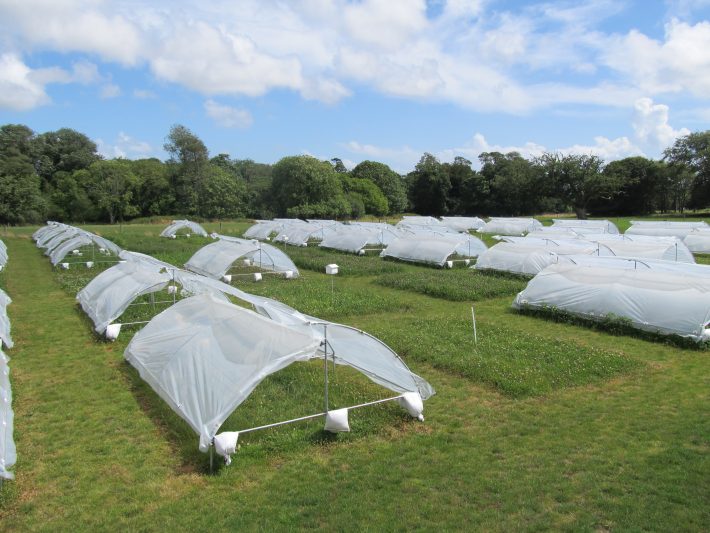Study finds that multi-species grassland mixtures increase yield stability, even under drought conditions
In a two-year experiment in Ireland and Switzerland, researchers found a positive relationship between plant diversity and yield stability in intensely managed grassland, even under experimental drought conditions. The results are presented today at the British Ecological Society’s annual meeting in Belfast.

The benefits of multispecies mixtures were so strong that yields from a mixture of four species under drought conditions matched or exceeded yields for monocultures under normal rainfall conditions.
The four species tested were agriculturally important and used for grazing livestock in temperate regions: perennial ryegrass, chicory, red clover and white clover.
“Multi-species mixtures can be an effective, farm-scale practical action that could be used to mitigate or even adapt to the effects of severe weather events such as drought
– said Dr. John Finn, Researcher at Teagasc, who will be presenting this collaborative research with Agroscope Switzerland at the conference.
“When I first started talking about investigating effects of drought in Irish grassland in 2009, some of the farmers that we spoke to thought I was crazy! There was more concern about winter waterlogging than summer drought. Since then, however, we have had two serious summer droughts, most recently in 2018. All of the climate models indicate that summer droughts will become more frequent and more severe.”
In Europe this means that grasslands will be increasingly subjected to intense winter rain precipitation and summer droughts. Protecting yield stability through methods like increasing the species diversity in grassland systems will become increasingly important.
In this study the effects of the experimental drought were substantial. However, compared to monocultures, higher yields in the four-species mixtures helped to compensate for this reduction. In Ireland, across three harvests during and just after the drought period, the average monoculture yields of 1.41 tonnes ha-1 in a harvest dropped to 1.08 tonnes due to drought; the multispecies mixture under drought yielded 1.3 tonnes ha-1.
In Switzerland, the average monoculture yields of 1.63 tonnes ha-1 in a harvest dropped to 1.26 tonnes ha-1 under drought; the multispecies mixture under drought yielded 1.9 tonnes ha-1. In addition, the variation in yield decreased as plant diversity increased.
The researchers sowed combinations of the four species in different plots to compare monocultures, two-species mixtures and four-species mixtures. Half of the plots (3 metres by 5 metres) were covered in rain shelters to create a severe drought event for nine weeks. This allowed them to compare the effects of plant diversity as well as drought on yield. A cutting regime was used to mimic grazing.
The research was performed across two sites in Ireland and Switzerland as part of AnimalChange, an EU project aimed at developing scientific guidance on sustainable development for livestock production under climate change.
The researchers are now looking to extend the length of the study and test other factors. “Our experiment was sown in one year, and we applied treatments over the following two years. Ideally, we would like to continue the experiment for several years.” said John Finn.
“We didn’t have a grazing treatment, and it would be important to confirm that the observed mixture benefits in a cutting regime would also occur under grazed conditions. This work is currently ongoing.”
The researchers have also begun testing the effects of greater species diversity, expanding the tests from four crops to six, introducing timothy grass and plantain, and looking more closely at levels of nitrogen fertiliser.
“We are finding similar results with six species over two years. This work is also being presented at the BES meeting in Belfast by Guylain Grange (PhD researcher at Teagasc).”, said John Finn.
These results were published in Haughey et al. (2018) Higher species richness enhances yield stability in intensively managed grasslands with experimental disturbance. Scientific Reports 8(1): 15047. https://doi.org/10.1038/s41598-018-33262-9
Dr. John Finn will present the group’s work on Wednesday 11 December 2019 at the British Ecological Society annual meeting. The conference will bring together 1,200 ecologists from more than 40 countries to discuss the latest research.
Media Contact:
Davy Falkner, Media Relations Officer, British Ecological Society
Email: davy@britishecologicalsociety.org
T: +44(0)7525966919
Like what we stand for?
Support our mission and help develop the next generation of ecologists by donating to the British Ecological Society.